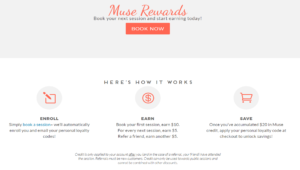 One of my good friends wanted to go to this painting studio, Muse, for her birthday this past weekend. I may not be the next Picasso but I do enjoy being creative so I was happy to go with her. She sent me the link to the event and I intended to only go to the site, sign up and go about my daily activities. Needless to say, I spent a half hour running through their site and exploring all of the classes that they offered.
One of my good friends wanted to go to this painting studio, Muse, for her birthday this past weekend. I may not be the next Picasso but I do enjoy being creative so I was happy to go with her. She sent me the link to the event and I intended to only go to the site, sign up and go about my daily activities. Needless to say, I spent a half hour running through their site and exploring all of the classes that they offered.
The page was very beautiful and very user friendly. Little things like customizing their search bar and showcasing their values in the form of a definition of muse gave the company that little bit of life needed for customers to bond with the company. When I saw that the company is using a referral process, the need for the careful website design became very clear to me. While a gorgeous UX is beneficial to any company, it is essential for a B2C company wishing to create a relationship with it’s customers. In this post, I would like to briefly discuss what is needed for a successful referral program and where it makes sense to use one.
What’s needed
In order for a referral program to be successful, the service or good that the company is providing needs to meet (and preferably exceed) expectations. Muse aims to give their customers such a great experience that when they leave, they will not only want to go back but they will bring their friends too! When a customer refers a company to one of their friends, the customer is putting their reputation on the line. I assume that no person would want to be associated with a bad product. Most people would want to be known as the friend that always has great products and goes to great places. Referral programs are typically the most successful marketing programs because potential customers are more likely to trust their friends who have used the good as opposed to some advertisement or online reviews left by strangers. In order to have a successful referral program, though, a company needs to ensure that every touch point that the customer has with them is positive, whether that be online or in the store.
Where to use it
Referral programs make the most sense for companies that have an intangible value, in my opinion. For example, I would be more likely to go to a specific hair stylist based on a referral from my friend than to buy a specific phone because my friend likes it and refers it to me. Tangible items, such as phones, have specific, concrete attributes that can be judged objectively. I can go online, see exactly what they have and compare them to other phones I had in mind. Hair salons though, no matter how many reviews you read, you will never get a really complete picture. Moreover, just because one stranger liked a particular cut or service doesn’t mean that you will. The same holds with your friend but to a lower extent. It’s assumed that you and your friend have some sort of commonality in tastes and, even if you don’t, that that person will know exactly what you want from a particular service. It goes back to the trust aspect. A referral program is best suited for situations with intangible items, where trust and specific preferences play a large role.
Besides increasing conversion rates, a referral program is also great for retention rates. For programs such as the one with Muse, I get points when someone goes to a session based on my recommendation but I also get points whenever I go to a session. Knowing that the product is good, this points program is all the incentive I need to become a repeat customer. What are your views of referral programs? Useful or not?